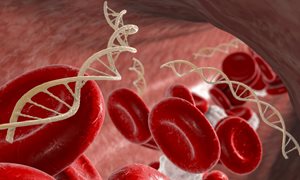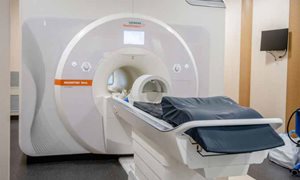
Pieces of tumor DNA in a patient's blood are a promising new biomarker. They indicate, for example, whether a therapy is effective against cancer. PhD candidate Sofie Tolmeijer of the Radboud university medical center shows that this tumor DNA already indicates two to five months earlier than a CT scan whether hormone therapy in prostate cancer is effective.
It is a relatively new marker in the medical world: circulating tumor DNA, or ctDNA for short. When tumor cells die, the cell debris, including fragments of DNA, will float in a patient's bloodstream for a while before they are being cleared from the body. The amount of this DNA coming from the tumor correlates with the size of the tumor. Doctors can detect this DNA with a blood sample, getting a lot of information about the tumor without the need for a tissue biopsy.
Switch
Sofie Tolmeijer shows in her dissertation the value of such a measurement of ctDNA. She conducted a study with 81 men with prostate cancer who received hormone therapy. She saw that the amount of tumor DNA in the blood four weeks after starting hormones is related to the effect of the therapy: if the value is high, the therapy does not work. In current practice, a doctor can only evaluate the treatment effect with a CT or bone scan after three to four months. ‘Thus, with a ctDNA test, a doctor can switch to another therapy much faster, or add an additional treatment’, Tolmeijer says.
In the prostate study, Tolmeijer used circulating tumor DNA to see whether a therapy has a durable effect, but researchers can also use this marker differently. For example, they can investigate the genetic characteristics of the tumor from blood for diagnostics. Sometimes DNA shows whether a tumor is sensitive to a particular therapy. Additionally, the concentration of tumor DNA in blood can inform us on the patient’s prognosis: a high concentration in the blood at the start of treatment is not a good sign. Thus, this marker can help with a personalized treatment plan.
Predictor
Tumor DNA from blood as an early predictor in prostate cancer therapy is not yet standard clinical care. But thanks to another study by Tolmeijer, a test with ctDNA is already available at the Radboudumc for patients with metastatic melanoma. Tolmeijer showed that the ctDNA measurements show very reliably, with 98% certainty, whether a melanoma has a so-called BRAF mutation. Then targeted therapy that inhibits BRAF can be started. The advantages? The test is on blood, so no tissue biopsy is needed, and a blood test is often much faster.
Still, ctDNA will not always be able to replace a biopsy. ‘In principle, any cancer can shed tumor DNA in the blood. But the amount is sometimes so low that we cannot measure it, especially if cancer has not yet metastasized’, Tolmeijer explains. ‘Measurements of tumor DNA from blood are especially interesting when the cancer is in a difficult location for a tissue biopsy, such as in lung cancer. Or in prostate cancer, which often metastasizes to the bones.’
What is the Radboudumc doing with circulating tumor DNA?
At the Radboudumc, the analysis of tumor DNA in blood is used clinically in melanoma and lung cancer. ‘We use it when tumor tissue is not sufficient for diagnostics’, says Professor of Molecular Tumor Genetics Marjolijn Ligtenberg. ‘But because circulating tumor DNA can play a role in treatment choices in many types of cancer, we are looking, together with colleagues from other centers, how we can use this type of analysis more broadly, and what is needed to base treatment decisions in the clinic on it.'
Other applications of measurements of tumor DNA in blood are still in the research phase, such as in bladder cancer and prostate cancer. Oncologist Niven Mehra: ‘We have been investigating the DNA in a tissue biopsy from men with prostate cancer for years, looking for clues for a suitable treatment. We now also have tumor DNA from the blood of five hundred patients, and we are looking at whether that provides the same information as a tissue biopsy, and can serve as an alternative test. In addition, we are investigating whether circulating tumor DNA can reliably indicate whether the tumor responds to various prostate cancer therapies.’
More information about this thesis defense
Thesis defense on October 26, 2023 at 10.30 am by Sofie Tolmeijer. Title dissertation: Circulating tumor DNA measurements to refine cancer treatment (available online after Oct. 26). Supervisors: Dr. Niven Mehra, Prof. Dr. M.J.L. Ligtenberg, Prof. Dr. W.R. Gerritsen, co-supervisor: Dr. M.J. Geerlings-Wagemaker. The defense can be followed via this livestream.
-
Want to know more about these subjects? Click on the buttons below for more news.
More information
Annemarie Eek

wetenschapsvoorlichter





